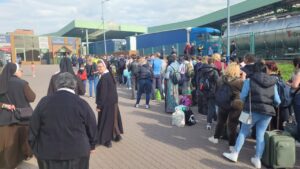Sr. Maria Louise’s Desert Rescue
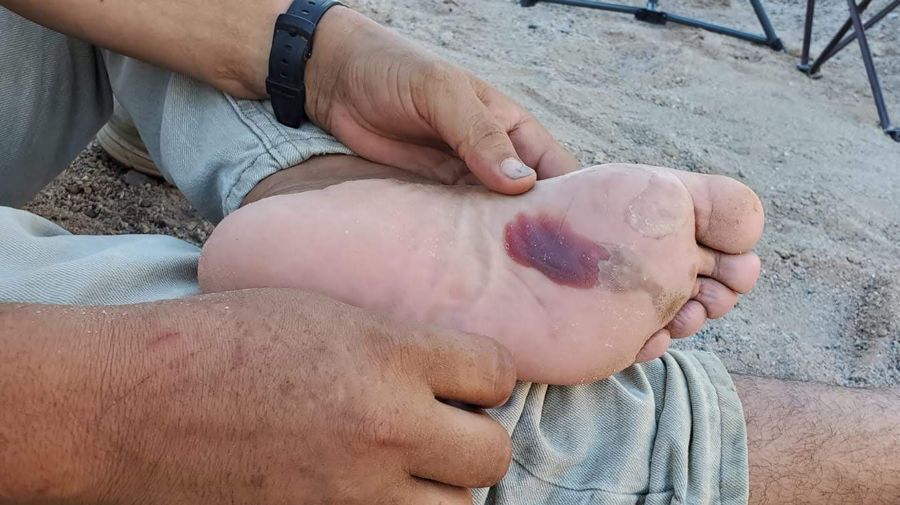
A yell rang out across the quiet of the desert.
The Águilas Del Desierto (Eagles of the Desert) volunteers had been out on a search mission for less than an hour, when a man appeared, slowly walking towards them. Not knowing who he was, they nervously watched him approach — until they realized he was a migrant on the verge of death.
The team immediately gave him water, and, his bare feet covered with blisters, he fell to the ground, hyperventilating, crying, and giving thanks to God.
If not for the Águilas team, this man likely would have died alone in the desert. “He would not have made it with the condition of his feet. He probably had another day or two of walking ahead before he would reach civilization. But he would have to have known which way to turn,” said Felician Sr. Maria Louise Edwards, vice president of Águilas del Desierto.
As Sr. Maria Louise prayed and comforted him, he reached for her crucifix and kissed it. Sister told him that she did not speak much Spanish, but he was not concerned about the language barrier; he kept talking to her and glorifying God for saving him.
He was a Honduran soldier, driven out of his home country by death threats from gangs who despise the police and military. Many migrants attempt to cross the desert to seek safety from death threats, extreme poverty, and corruption.
According to the Missing Migrants Project, nearly 3,000 people have died or been reported missing crossing the border since 2014, including 290 from January to June of this year. Many have been fed misinformation and are unequipped for the treacherous journey.
This man had walked through the desert for four days with no shoes, and very little water; he hadn’t eaten in three days.
The man agreed to receive medical care and to work with Border Patrol to plead his case for asylum. His phone had died days ago, and the team helped him call his family to let them know he was safe.
“I’ve never been there for a live rescue before, and to be honest, it was very emotional,” said Sr. Maria Louise. “At first, I was just responding to his reaction and the realization that he wasn’t going to die. It’s hard to put into words. At the time, I wasn’t thinking ‘we’ve just saved someone’s life.’”
Sr. Maria Louise spoke with anguish and anger as she described the lack of compassion for migrants she has heard and witnessed during her time with Águilas. Some have criticized this mission and blamed migrants for the “poor decisions” that led them to travel through excruciatingly dangerous conditions in the desert. For Sr. Maria Louise, a belief in the sacredness of human life extends to those traveling through perilous conditions across national borders.
Sr. Maria Louise understands that migrants have endured such extraordinarily difficult circumstances that they are willing to risk their lives by crossing the desert. The Águilas del Desierto campaigns in Mexico attempt to educate people about the dangers of trying to cross, but many still come.
The opportunity to help save lives and rectify a lack of compassion for migrants has been a source of blessing to Sr. Maria Louise: “I’m just so grateful to God that he lets me be a part of this ministry and do this as part of my religious vocation. It has helped me to understand what it means to be a sister. I never understood until I encountered Águilas that sisters are like first responders in a certain sense, because we look for the suffering and that’s where we go.”
Learn more about Águilas del Desierto, their work and how to support a search at AguilasDelDesierto.org.
View the current issue here:
Sisters Against Trafficking Newsletter August, 2022
S Margaret Reflection about being with the Sisters and Ukrainians Refugees
Perception vs. Reality St Anthony Messenger, June/July Issue 2022
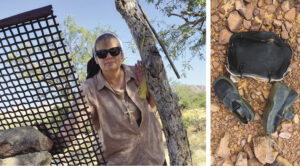 In the summer of 2018, Sister Maria Louise Edwards—who belongs to the Felician Sisters of North America—happened upon a photo essay in the New York Times titled “They Have a Mission in the Desert: Finding the Bodies of Border Crossers,” by Simon Romero, with photos by Victor J. Blue. The story stopped her in her tracks. It described the efforts of an organization called the Águilas del Desierto (“Eagles of the Desert”) to recover the remains of migrants who died during border crossings.
In the summer of 2018, Sister Maria Louise Edwards—who belongs to the Felician Sisters of North America—happened upon a photo essay in the New York Times titled “They Have a Mission in the Desert: Finding the Bodies of Border Crossers,” by Simon Romero, with photos by Victor J. Blue. The story stopped her in her tracks. It described the efforts of an organization called the Águilas del Desierto (“Eagles of the Desert”) to recover the remains of migrants who died during border crossings.
“I was really moved by what I read, but, at the same time, it was like this complete disconnect because I couldn’t understand how all of this was happening, and this was the first I had heard of it,” Sister Maria Louise says. The photo essay showed a group of volunteers braving the heat to help a man locate the remains of his brother. As Sister Maria Louise learned more about the Águilas, she saw that the organization was helping to bring closure to families and dignity to those who died in the desert.
Save the Date: Wear Orange on June 3

Every year on the first Friday in June, members of the gun violence prevention movement come together to honor survivors of gun violence and demand a future free from this crisis. With more shootings every day, such as the recent Southern California church shooting and Buffalo shooting, we invite you to join moms, students, veterans, survivors, and others by wearing orange throughout the weekend to show your support—in every state across the country.
June 3 is National Gun Violence Awareness Day, starting Wear Orange Weekend to honor those killed and wounded by gun violence, and to call for an end to our country’s gun violence crisis. FAN staff will be taking part and we hope you will join us. Find ways to join in online by clicking here.
FELICJAŃSKA KOMISJA SPRAWIEDLIWOŚCI, POKOJU I OCHRONY STWORZENIA
Sisters Against Trafficking Newsletter
Justice, Peace and Integrity of Creation (JPIC)
Stop Trafficking Awareness Advocacy Action
Resources for peacemaking and nonviolence:
- Bystander intervention: Mennonite Mission Network
- Dialogue: Having better conversations on divisive issues (MCC Canada)
- Peaceful protests: Nonviolence guidelines
- Prayer walks and singing: Peace prayer walk toolkit | Hong Kong protests: How Hallelujah to the Lord became an unofficial anthem
- Polarization: Beacon: Us and Them | National Association of Evangelicals: For the health of the nation
- Protect the Results coalition: https://protecttheresults.com/
- Faithful Democracy’s “Sacred Season of Voting”: https://faithfuldemocracy.us/resources/
- Faithful America is encouraging pastors to preach about counting every vote and this article from NCR, which has a Catholic focus, talks about a lot of these efforts.
“It was so much higher than I expected. I wondered aloud how anyone could possibly climb over it. One volunteer said they use ladders on the Mexican side to climb up, and then drop down onto the US side. It seemed impossible to not get hurt.
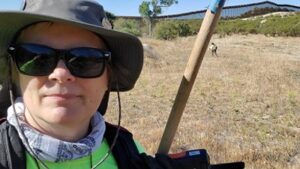
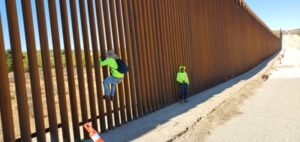 “The Wall seemed to be about two stories high, maybe 20 feet. Another volunteer remarked that the gentleman we were searching for didn’t get very far. Someone said that he had broken his leg when he dropped down. He tried to continue, but within a very short time, the group had to leave him behind.
“The Wall seemed to be about two stories high, maybe 20 feet. Another volunteer remarked that the gentleman we were searching for didn’t get very far. Someone said that he had broken his leg when he dropped down. He tried to continue, but within a very short time, the group had to leave him behind.
“Someone pointed to a powdery sandy area and said that authorities rake this sand so footprints will be clearly seen if someone jumps down and walks across it. The bars are about six inches apart. “One of the guys tried to climb it like a coconut tree, but he didn’t get very far. I put my arm through and for a few moments I was in two countries. I wondered how anything ‘we have’ could need this much protection. “The group returned to the search area a little subdued. Unfortunately, the vegetation was so thick that we did not locate the migrant’s body.”
The following is a joint statement issued by The National Black Sisters’ Conference (NBSC) and the Leadership Conference of Women
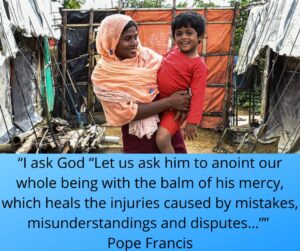
Religious (LCWR) in response to the conviction of former police officer Derek Chauvin for the murder of George Floyd.
We, the National Black Sisters’ Conference and the Leadership Conference of Women Religious, stand together in our commitment to the sacred dignity of each human person as emphasized in Catholic Social Teaching.
In the aftermath of the guilty verdict in the trial of Derek Chauvin for the murder of George Floyd, we recommit to working for real and sustained systemic change in the struggle to end institutional racism in every aspect of our society. Sadly, we know that the trend of fatal police shootings has only escalated in this country over the last four years. The rate of fatal police shootings among Black Americans is much higher than that of any other ethnic group. Starting with the savage beating of Rodney King in Los Angeles in 1991 up to the murder of George Floyd in Minneapolis, the trend of abuse at the hands of law enforcement has alarmingly increased.
In 2020 there were 1,021 fatal police shootings, and in the first three months of this year 213 people have been shot by the police; 30 of whom were African Americans. Police brutality is only one of the many manifestations of systemic racism; but it is one that too often ends in the death of too many young African Americans. We believe that we are at a crucial moment in race relations in this country. We must acknowledge and work to eradicate the sin of White Privilege that seeks to affirm the false superiority of Anglo-Saxon culture and way of life. We must as Dr. Martin Luther King, Jr. admonished us “learn to live together as brothers (and sisters) or perish together as fools.” Therefore, we call upon all people of good will and especially people of faith to join us in working for real and sustainable solutions to the racial divide in our country. We will not rest and our work will not be done until the belief that all people are created equal and entitled to the promise of life, liberty, and the pursuit of happiness, is a lived reality for every American citizen.
Felician Sisters Changing the World with the Community of Sant’Egidio
 |
|
|
A painting near the dining room
|
The Community of Sant’ Egidio is an “international public association of the laity” of more than 60,000 lay people active in more than 73 countries throughout the world. The Community was founded in 1968 by ndrea Riccardi, an Italian historian, professor, politician and activist.
The second refugee family consisted of two teenage girls who were being hidden from their Muslim uncle who attempted to sell them into marriage to terrorists. Both families stretched the sisters’ understanding of different cultures and religions and opened their hearts to all in need.
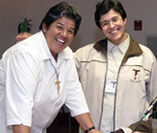
S Jusciêda Maria Araύjo Menezes joined Sister Margaret on Friday evenings at the Community Center. Sister Jusciêda continued her service at the Community Center. The poor around the Vatican greet Sister Jusciêda as Madre.
After being set up to house the homeless, the palace was dedicated and blessed by Pope Francis. Sister Jusciêda volunteered to serve breakfast on Saturday and Sunday mornings. Since the hope was to have women religious and seminarians involved in this ministry, Sister Jusciêda invited members of the Generalate community to assist her in serving breakfast on the weekends.
Thus far, S Elaine Marie Frigo, SM Anita Bienia, SM Carlotta Myszka, SM Dominika Kazimierczuk, and SM Renée Kurczaba have volunteered their time to minister to the poor. According to Sister Renée, the most important aspect of this ministry is one of presence. She explained, “Most of the sisters do not speak Italian, but the poor around the Vatican are from several European countries and some of them speak English. However, the gift of presence transcends language.”
“We see no way out, but we never despair.”
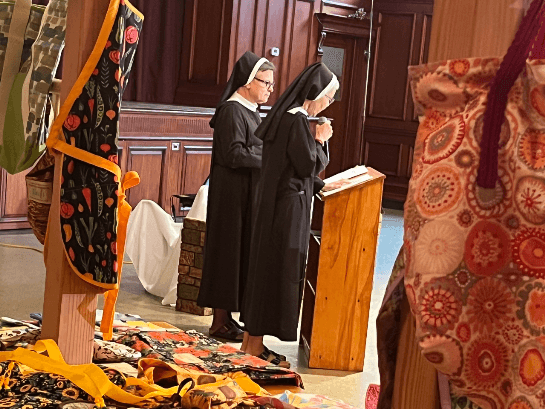
A reflection by Sr. Mary Inga Borko and Sr. Marilyn Marie Minter
With broken hearts and overwhelmed by mourning, we write our story, a miracle of God’s providence and the power of prayer of so many people.
For over two years, life in Haiti has been very difficult. After the assassination of the President in July 2021, it became worse. Gang violence, kidnappings, rape, senseless killing of innocent people — including children. The gangs were controlling many parts of Port au Prince, the capital. This violence displaced many families who were forced out of their homes to live in tents in mountain areas. Then the situation changed and Jacmel started to experience violent demonstrations.
Since August, there has been no way to do any group activities in our mission. Besides dinner, we were giving peanut butter sandwiches and water all day to children and other hungry people who came to our door. Every day it was getting more difficult to buy gas, food (even bread), propane gas, and drinking water; prices were rising unbelievably high. Our Haitian brothers and sisters knew that our presence in the city might provoke demonstrators to violence.
On the feast of Our Lady of the Rosary, October 7, we had some people in the sewing school; many teenagers were working around the mission and coming despite the demonstrations — because they knew it was peaceful, and they would be able to eat. At noon, we all gathered under the tree to say the rosary for peace in Haiti and in the world. We received a phone call with a warning that violent demonstrators had just entered Caritas. Our mobile clinic works under Caritas. The Catholic school and Caritas were looted and ransacked; cars and containers were burned. Later, we heard rumors that the demonstrators were planning to kill the director of Caritas. The week before, the office of the electric company was attacked and destroyed. People have not had electricity provided by the city for months already.
Up to this point, nothing has happened to our mission. Maybe it is because of the prayers of +Sr. Victoria Indyk, who buried medals of the Immaculate Heart of Mary in every corner of the buildings during the time our mission was being built. We hope it will stay safe.
Many other charitable institutions have been attacked and destroyed throughout the country. In Jacmel, for example, demonstrators took the body of a man who died from tear gas that police used and carried the body from the church to the police station, only to raise more hatred and violence. Later, in the same place, people were demonstrating against the USA, waiving a Russian flag and declaring that they do not want the United States or Canada sending military troops to defend them.
After many urgent messages from the U.S. embassy to leave Haiti immediately, and after discerning with our sisters, we made the decision to return to the USA. The most difficult part of the journey was to get a little plane from Jacmel to Port au Prince. Our internet had been scattered, and communication was getting more and more difficult, but you have to go on the day they tell you and at the hour they assign. Our day was October 10, Feast of Blessed Mary Angela. Arriving at the airport in Jacmel, we were immediately rushed to the plane and left right away because demonstrators were approaching the airport; the pilots were afraid the plane would be destroyed. Thank God for our pilot friend, who helped us get a plane out of Port au Prince to the Dominican Republic. We have friends in Santo Domingo, who met us at the airport and welcomed us to stay overnight in a retreat house. We had standby flights on Tuesday to JFK.
There are three people staying in our mission. They continue to feed hungry or starving people. We left them means to do this, and we will continue to do so. Our mobile clinic works whenever they can. For the poor, it is on some days the only place where they can get help or medications.
We do not feel that we deserted or abandoned our people. We had to make a decision for this moment that was the better one — not only for us, but for our mission to be safe. We knew of how Haitian people resisted any outside help to resolve gang problems, and especially do not want military help from the USA. We arrived to the States with nothing of our own. We will return to Haiti as soon as possible. Pray it is soon.
“We see no way out, but we never despair.”

A reflection by Sr. Mary Inga Borko and Sr. Marilyn Marie Minter
With broken hearts and overwhelmed by mourning, we write our story, a miracle of God’s providence and the power of prayer of so many people.
For over two years, life in Haiti has been very difficult. After the assassination of the President in July 2021, it became worse. Gang violence, kidnappings, rape, senseless killing of innocent people — including children. The gangs were controlling many parts of Port au Prince, the capital. This violence displaced many families who were forced out of their homes to live in tents in mountain areas. Then the situation changed and Jacmel started to experience violent demonstrations.
Since August, there has been no way to do any group activities in our mission. Besides dinner, we were giving peanut butter sandwiches and water all day to children and other hungry people who came to our door. Every day it was getting more difficult to buy gas, food (even bread), propane gas, and drinking water; prices were rising unbelievably high. Our Haitian brothers and sisters knew that our presence in the city might provoke demonstrators to violence.
On the feast of Our Lady of the Rosary, October 7, we had some people in the sewing school; many teenagers were working around the mission and coming despite the demonstrations — because they knew it was peaceful, and they would be able to eat. At noon, we all gathered under the tree to say the rosary for peace in Haiti and in the world. We received a phone call with a warning that violent demonstrators had just entered Caritas. Our mobile clinic works under Caritas. The Catholic school and Caritas were looted and ransacked; cars and containers were burned. Later, we heard rumors that the demonstrators were planning to kill the director of Caritas. The week before, the office of the electric company was attacked and destroyed. People have not had electricity provided by the city for months already.
Up to this point, nothing has happened to our mission. Maybe it is because of the prayers of +Sr. Victoria Indyk, who buried medals of the Immaculate Heart of Mary in every corner of the buildings during the time our mission was being built. We hope it will stay safe.
Many other charitable institutions have been attacked and destroyed throughout the country. In Jacmel, for example, demonstrators took the body of a man who died from tear gas that police used and carried the body from the church to the police station, only to raise more hatred and violence. Later, in the same place, people were demonstrating against the USA, waiving a Russian flag and declaring that they do not want the United States or Canada sending military troops to defend them.
After many urgent messages from the U.S. embassy to leave Haiti immediately, and after discerning with our sisters, we made the decision to return to the USA. The most difficult part of the journey was to get a little plane from Jacmel to Port au Prince. Our internet had been scattered, and communication was getting more and more difficult, but you have to go on the day they tell you and at the hour they assign. Our day was October 10, Feast of Blessed Mary Angela. Arriving at the airport in Jacmel, we were immediately rushed to the plane and left right away because demonstrators were approaching the airport; the pilots were afraid the plane would be destroyed. Thank God for our pilot friend, who helped us get a plane out of Port au Prince to the Dominican Republic. We have friends in Santo Domingo, who met us at the airport and welcomed us to stay overnight in a retreat house. We had standby flights on Tuesday to JFK.
There are three people staying in our mission. They continue to feed hungry or starving people. We left them means to do this, and we will continue to do so. Our mobile clinic works whenever they can. For the poor, it is on some days the only place where they can get help or medications.
We do not feel that we deserted or abandoned our people. We had to make a decision for this moment that was the better one — not only for us, but for our mission to be safe. We knew of how Haitian people resisted any outside help to resolve gang problems, and especially do not want military help from the USA. We arrived to the States with nothing of our own. We will return to Haiti as soon as possible. Pray it is soon.


